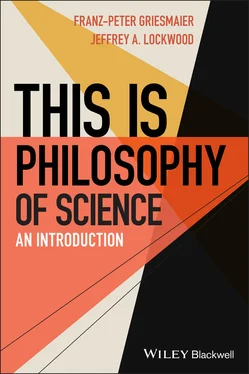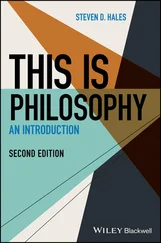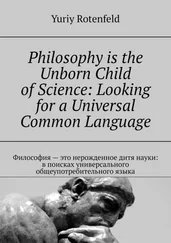Franz-Peter Griesmaier - This is Philosophy of Science
Здесь есть возможность читать онлайн «Franz-Peter Griesmaier - This is Philosophy of Science» — ознакомительный отрывок электронной книги совершенно бесплатно, а после прочтения отрывка купить полную версию. В некоторых случаях можно слушать аудио, скачать через торрент в формате fb2 и присутствует краткое содержание. Жанр: unrecognised, на английском языке. Описание произведения, (предисловие) а так же отзывы посетителей доступны на портале библиотеки ЛибКат.
- Название:This is Philosophy of Science
- Автор:
- Жанр:
- Год:неизвестен
- ISBN:нет данных
- Рейтинг книги:5 / 5. Голосов: 1
-
Избранное:Добавить в избранное
- Отзывы:
-
Ваша оценка:
- 100
- 1
- 2
- 3
- 4
- 5
This is Philosophy of Science: краткое содержание, описание и аннотация
Предлагаем к чтению аннотацию, описание, краткое содержание или предисловие (зависит от того, что написал сам автор книги «This is Philosophy of Science»). Если вы не нашли необходимую информацию о книге — напишите в комментариях, мы постараемся отыскать её.
This is Philosophy of Science
This Is Philosophy???
, This is Philosophy of Science: An Introduction
This is Philosophy of Science — читать онлайн ознакомительный отрывок
Ниже представлен текст книги, разбитый по страницам. Система сохранения места последней прочитанной страницы, позволяет с удобством читать онлайн бесплатно книгу «This is Philosophy of Science», без необходимости каждый раз заново искать на чём Вы остановились. Поставьте закладку, и сможете в любой момент перейти на страницу, на которой закончили чтение.
Интервал:
Закладка:
You’ve been given an assignment–perhaps a paper to write or presentation to give–and you sure don’t want to mess up technical terms. The website Glossary is an ideal resource to assure that when you write “emergent properties” or say “empiricism” you don’t rely on a philosophically flawed use of the words.
The exam is just days away. How can you best prepare? First, go to the website Glossary and make sure you’ve fully mastered the basic concepts that appear in the chapters covered by the test. And second, test yourself using the multiple-choice questions that appear on the website (these represent many of the important topics covered in each chapter).
As the instructor of the course, tapping into the chapter quizzes on the website might provide an ideal basis for organizing a study session for your students–and perhaps even telling them that your exam will include questions drawn directly from the website!
1 PILLARS OF SCIENCE: REASONS, KNOWLEDGE, AND TRUTH
The empirical sciences are dedicated to describing, explaining, and predicting natural phenomena, such as ionic bonding, predation rates, formation of galaxies, bird migrations, gravitational waves, protein metabolism, or the probability of an earthquake in northern California. The ultimate goal is to gain genuine knowledge about such phenomena – what exactly they are, what regularities govern their occurrence, why and how they occur, when they might happen in the future, and with what probability.
In subsequent chapters, we will investigate many of the difficult and fascinating issues involved in a successful exploration of the natural world. Some of those issues arise with equal force in different sciences, while others may arise in only one discipline, but not in any of the others, at least not in the same form. For now, however, we are going to discuss some of the concepts and procedures that arguably can be found in all empirical sciences. These include (i) the fundamental nature of reasons we give for accepting or rejecting a scientific hypothesis, or any ordinary claim about the world for that matter; (ii) the general structure of the different kinds of inferences we can make on the basis of observations; (iii) the nature of truth and the specter of relativism; and (iv) the relation between facts, hypotheses, laws, and theories. Having a good grasp of these concepts will prove invaluable for understanding the intricacies of empirical science and the philosophical problems that arise in the course of scientific investigations.
The initial discussion will be a bit on the abstract side, and you might at first find it puzzling how questions such as the ones we are going to raise in this chapter are of any relevance to the practice of science. The situation is perhaps similar to learning the rules of baseball before swinging a bat. Sure, you might hit the ball if you don’t know the how the game is played, but you might well run in the wrong direction afterward! And so, as our discussion proceeds in the later chapters, you will find that having gained mastery of some fundamental concepts in epistemology (the study of knowledge) is of great value. So let’s get going.
1.1 Epistemic Reasons
Typically, when we wonder whether we should accept some claim, such as a scientific hypothesis, or not, we look for reasons for doing so. Another way of putting this is that we don’t believe something without having reasons. For example, if someone asks you to accept that there are intelligent, extraterrestrial life forms, you’re likely to ask for reasons before you adopt this belief. And if the other person just hems and haws, you’re not going to believe in extraterrestrials. On the other hand, if you are presented with the cosmic background radiation as evidence for the occurrence of the so-called Big Bang, you have some reason for believing that the universe emerged through this sort of process. (Notice that when we use the term “belief,” we do not mean to talk about religious faith.)
Of course, not any old reason is a good reason. If I believe something because I would like it if it were true, or because I am better off believing it, the belief might well turn out to be false – and in the overwhelming number of cases, it will be. Wishful thinking rarely leads to true beliefs. Thus, we need another kind of reason for believing something if we want to find out the truth about the world.
Reasons of the desired kind are called epistemic reasons. They are the sort of reasons that allow us to accept a belief only if there is good evidence for its truth, or only if the belief doesn’t contradict other, already well-established beliefs derived from good evidence. Of course, it is very contentious what makes for a good epistemic reason. The debate over which (types of) epistemic reasons are to be preferred over others constitutes part of what’s called epistemology , or the study of knowledge. Epistemic reasons are usually divided into two kinds: those which guarantee , in a sense to be specified momentarily, the truth of their target beliefs, and those that merely make the truth more probable . We start with the former.
1.1.1 Conclusive Reasons
The first type of epistemic reasons are called conclusive reasons. A reason (R) is conclusive for some belief (B) if and only if the belief B must be true if R is true . And this condition holds even if there is not just one reason for B, but also in cases in which B rests on many reasons. In more general terms, if all the reasons for a belief are true, and if they are conclusive reasons, then their target belief must be true. Conclusive reasons guarantee true beliefs, which is strongest basis one can have for believing something. So, how can we understand this definition?
A good example for conclusive reasons are the premises of a deductively valid argument . In such an argument, if all the premises are true, then the conclusion must be true as well. Here’s a simple example:
| Premise 1: | All humans are mortal. |
| Premise 2: | Stephen Hawking is human. |
Conclusion: Thus, Stephen Hawking is mortal.
Clearly, if premises 1 and 2 are both true, then the conclusion is guaranteed to be true. Thus, the two premises together are conclusive reasons for believing that Hawking is mortal. But this sort of reasoning is not often helpful for advancing our scientific understanding of the world. Let’s see why.
Notice that in a deductive argument, what’s really happening is that information that is already contained implicitly in the premises, is made explicit in the conclusion. In other words, the conclusion does not reveal any new information. It restates the information that’s already contained in the premises. That’s why such inferences are safe : truth in – truth out.
Deductive reasoning (i.e., reasoning that proceeds by providing conclusive reasons) is mostly confined to two major disciplines: mathematics and logic. Yes, sometimes we use deductive reasoning in the empirical sciences, such as in cases in which we deduce observational consequences from a theory in order to test it (which can include refuting the theory):
| Premise 1 (Theory 1) | All birds can fly. |
| Premise 2 (Theory 2) | Penguins are birds. |
| Premise 3 (Deduced Consequence) | Penguins can fly. |
| Premise 4 (Observation): | Penguins can’t fly. |
| Conclusion: | Not all birds can fly. |
However, a lot of scientific reasoning is nondeductive. Why? Because typically, in scientific reasoning, we want to infer something about the world at large on the basis of a limited number of observations. Such inferences are inherently risky because their conclusions convey information that goes beyond the information contained in the descriptions of the actual, limited observations that have been made.
Читать дальшеИнтервал:
Закладка:
Похожие книги на «This is Philosophy of Science»
Представляем Вашему вниманию похожие книги на «This is Philosophy of Science» списком для выбора. Мы отобрали схожую по названию и смыслу литературу в надежде предоставить читателям больше вариантов отыскать новые, интересные, ещё непрочитанные произведения.
Обсуждение, отзывы о книге «This is Philosophy of Science» и просто собственные мнения читателей. Оставьте ваши комментарии, напишите, что Вы думаете о произведении, его смысле или главных героях. Укажите что конкретно понравилось, а что нет, и почему Вы так считаете.












